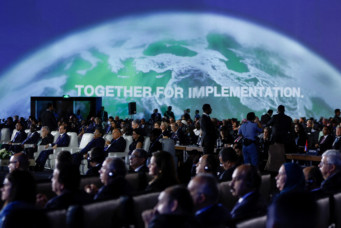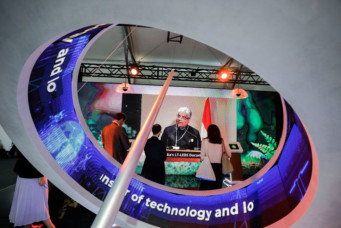COP27: Kick the Climate Can Down the Road Another Year
With one COP after another kicking the can down the road, the prospective loss and damage fund is threatened by the same diversionary tactics. To succeed in the climate battle, we need transformative institutions and courageous leadership

Men collect their belongings as floods and torrential rains deluge the outskirts of Peshawar, Pakistan, April 3, 2016. Fayaz Aziz/Reuters
Each year, a Conference of the Parties (COP) for the United Nations Framework Convention on Climate Change is hosted in a different city, and each year there is disappointment at the lack of tangible and binding outcomes. The scarcity of ambition at UN climate conferences is not surprising since the nature of these meetings perennially disappoints everyone except oil executives; these meetings essentially become “empty” sets of institutions. This is what political scientist Radoslav Dimitrov calls agreements without substantial, binding regulatory commitments. The near-thirty years of COPs have woefully failed in their objective to prevent dangerous planetary warming despite celebratory press releases issued by the UN at the end of every COP.
Empty institutions are encouraged in a neoliberal international political economy, where regulation is and has been reduced or eliminated, to make way for business and industrial activities; these apparatuses normalize rhetoric and window dressing over substantive state restrictions. In the case of climate change, empty institutions are a poisonous menace to people and the planet.
Only days before COP27, the UN released an assessment of current commitments to reduce greenhouse gas emissions under the 2015 Paris Agreement. The report indicated that current commitments will increase emissions 10.6 percent by 2030 compared to 2010 levels, and will result in warming of 2.5 degrees Celsius by the end of the century. Oddly, this is better than a similar assessment done last year. These trends will be a priority at COP28 when the first Global Stocktake—assessing the Paris Agreement’s implementation—concludes. COP28 will be presided over by CEO of the United Arab Emirate’s state oil giant, Abu Dhabi National Oil Company, Sultan Al-Jaber. That may be the only information we need to take stock of climate politics.
Certainly, there was no serious progress toward reducing emissions at COP27. However, after little progress in twenty-six other COPs, this is also not surprising.
Mitigation through Empty Institutions
When we had the 1997 Kyoto Protocol, which mandated specific greenhouse gas reductions, there was a lack of participation from some countries, key among which was the United States. Skip ahead to the 2015 Paris Agreement which, as noted above, did not get the job done because the cuts are not ambitious enough; unsurprisingly, the agreement was designed to be that way.
The Paris Agreement was devised to accommodate even the most reticent state because it only asked parties to the accord to say what they want to cut and how, and then report it. These are called nationally determined contributions (NDCs), and they are not binding under international law for countries to achieve their commitments—only that they have NDCs and report them every five years. The agreement hopes that commitments “ratchet” up but the language—in Article 4, Section 3—holds that, “Each Party’s successive nationally determined contribution will represent a progression beyond the Party’s then current nationally determined contribution”. Given the current language, a “progression” can represent even the slightest of marginal improvements, whereas if the agreement had said that “each successive NDC must reduce X percent of emissions,” it would have been much clearer and more demanding.
Perhaps the most ambitious international climate institution we have is the Montreal Protocol to remove ozone-depleting substances from the stratosphere. It is a landmark protocol because it does have regulatory, binding commitments that have become steadily more strict, and it has saved us from considerable warming because of its regulation of substances that have warming effects.
In contrast, Paris is an empty institution, par excellence. To succeed in the climate battle, we need transformative institutions and courageous leadership—we need high-level champions for real. The effect of this failure is that the cost of loss and damage will be more deadly, more expensive, and more widespread due to more numerous extreme climate events, without serious cuts to emissions.
Will Incrementalism Reign Supreme over Loss and Damage?
Despite the emptiness of so many of the UN climate decisions, there was what the UN press release at the end of COP27 called a “breakthrough agreement” when governments agreed to create a fund specifically for climate-related “loss and damage” in developing countries. Loss and damage has no official definition but typically means dangerous climate-related impacts to which communities cannot adapt.
The term was first used in the Bali Action Plan of 2007 and in 2010 at COP16 where a committee was formed to consider approaches. In 2012, the creation of a mechanism to deal with loss and damage was agreed upon, so the following year the COP created the Warsaw International Mechanism for Loss and Damage associated with climate change impacts. This mechanism only facilitates capacity building, including fund building, but it does not include funding for losses and damages. The Warsaw mechanism avoided financing while making it look like the issue was being addressed, so that no one at the time would object. Its goals had uninspiring phrases like “enhancing knowledge,” “strengthening dialogue,” and “providing technical support.” It was also apparent from the history of negotiations around loss and damage that developed countries have kept the agenda to a snail’s pace and clear of substantial commitments.
Financing loss and damage nevertheless remained a priority for developing countries for well over a decade, but has been blocked by their developed counterparts. This intransigence deeply angered delegates from developing countries at COP27. The progress made at the conference came with a last-minute capitulation from the European Union (EU), though the EU wanted more countries to contribute to the mandatory emission reductions under the 1997 Kyoto Protocol, which places binding responsibilities on the shoulders of wealthy countries. The EU wanted this shift because over the last few decades, emerging economies and those heavily dependent on oil, like those in the Gulf Cooperation Council, have become more capable of contributing given that they are ranked in the top 30 countries for purchasing power parity-adjusted GDP per capita. Qatar, for example, ranks first in the world for purchasing power as well as CO2 emissions per capita (35.59 metric tons in 2021). However, the delegate from China (which ranks 79th in the GDP per capita rankings and produces 8.05 metric tons of emission per capita) disagreed, and said that, “It is not the obligation of China to provide financial support under the UNFCCC.” So, the decision to create a fund, while late, is clearly a significant political victory for developing countries given the successful stonewalling by wealthy nations to write a check. The scale of the “loss and damage” problem is truly profound as developed countries fear that the check would functionally need to be a blank one. For instance, one example of loss and damage is the submergence of a small island state, making it uninhabitable and potentially eliminating that country. What would the compensation be for such existential threats? Traditional ideas of national security are simply not adequate to cover the magnitude of the threat, and it sounds like something no one can afford, especially small island inhabitants. This very risk is behind the 2015 Suva Declaration on Climate Change by the Pacific Island Development Forum, which calls for authentic regulation of emissions and international climate justice. Item 7 of the Suva Declaration says:
irreversible loss and damage caused by climate change goes beyond adaptation and is already a reality for PSIDS [Pacific small island developing states] if there is inadequate mitigation action, and that climate change is already resulting in forced displacement of island populations and the loss of land and territorial integrity and further highlight that such loss and damage results in breaches of social and economic rights.
The COP27 loss and damage decision puts in place a transitional committee “with a view to operationalizing the funding arrangements”. Naturally, when a decision is made on the last day of a COP, as this one was, it is difficult to discuss and finalize the many details associated with the move. It is concerning that except for the initiative to start organizing the committee which will produce a report on loss and damage progress, many necessary details have been left out of the decision. It is worth noting that the International Monetary Fund and the World Bank are invited to consider what they could contribute to loss and damage during their 2023 spring meetings.
Whether this turns out to be a serious weapon to combat loss and damage is yet to be seen, but the discussed history of drastic incrementalism means there is considerable reason to worry. Remember that in 2009 at COP15 in Copenhagen, wealthy countries pledged 100 billion dollars a year by 2020 to fund adaptation and mitigation in poorer countries. That promise was never honored.
Some pledges went through the Green Climate Fund, an investment scheme established during the Cancun COP in 2010 and funded by developed countries as well as private financial institutions. Half of the funds are spent on mitigation and the other half on adaptation matters such as scaling up decarbonization tactics. An analysis by the Frankfurt School-UNEP Centre shows that 24 percent of the fund’s projects are related to loss and damage.
Financing loss and damage is complex and more than just creating relief aid for disasters. According to the Paris Agreement, it should avert (reduce greenhouse gasses), minimize (build more resilient communities), and address loss and damage (help people after they experience a problem) which can occur at a slow onset (for example, desertification) or through extreme events (such as tropical cyclones).
The transitional committee will have to wrestle with other questions as well beyond who will be expected to contribute. Will it act as an insurance policy like the African Cities Water Adaptation Fund? Launched at COP27, this is an African-led insurance that will cover climate-related losses up to 14 billion dollars. How anticipatory will funding be? Will it, say, be used to build a Pakistan less vulnerable to flooding? Clearly, proper funding for loss and damage should be very proactive to avert more harm. Will civil society groups who help in a place like Pakistan be eligible to receive funding or will this only be directed to governments? Certainly, civil society groups will end up doing a lot of the work so they will need a share, but what do we expect that to look like if the money first goes to governments that run patronage-based authoritarian economies? What will oversight of spending look like? How will contributions be determined—perhaps by the scale of legacy emissions? Domestic politics in the United States would curdle any resolve Washington might have if this is the case, even though calculating contributions in this way would be just and appropriate.
The United States already fosters a virulent and effective conservative social countermovement to cast doubt on the basics of climate science which in the past empowered two presidents to pull out of the Kyoto Protocol (George W. Bush) and the Paris Agreement (Donald Trump). President Biden re-committed the United States to Paris, but the point is that the world now knows that it cannot trust the United States to remain committed when the next conservative Republican president is elected. This is looking more and more likely for 2024. Many conservatives in the United States see climate change as a hoax and conspiracy that will be used to create a world government and redistribute wealth. Climate denial runs on the fear that climate policies like the loss and damage decision are meant to drain the United States of power, rob people of freedom, and arrest Western progress. Since the loss and damage problem is so enormous and the liability so potent, the decision to finance it is exactly the kind of international agreement conservatives have feared.
In any case, there is a lot of uncertainty and it remains to be seen if the decision to set up a committee with a view to operationalize a loss and damage fund ends with real assistance for monumental problems or more vague promises.
Parallel Processes
One promising result that transpired at COP27 was that the United States and China agreed to resume bilateral climate talks. This agreement, however, is fragile and uncertain as the U.S.-China relationship goes through periods of tension—witness the shooting down of suspected Chinese spy balloons over the United States. Their talks are critical because the two countries have the highest cumulative emissions. Sometimes these processes that run alongside but are not part of the COP can be productive.
Another parallel process is related to methane reductions, because it is a powerful greenhouse gas. Currently, there are 150 countries which have signed the Global Methane Pledge and promised to voluntarily reduce its emissions by 30 percent. This would be significant if it bears out—there is good reason to think it might—because cutting methane emissions does not necessarily mean reducing fossil fuel use, but does require fossil fuel production to be cleaner. The Biden administration has already put policy tools in place for this to begin, and the easy sell to the majority of the world indicates these cuts in emissions are a low-hanging fruit.
Another, developing effort is The Fossil Fuel Non-Proliferation Treaty Initiative which is being proposed by global civil society groups and some governments. This is an effort to make a treaty to end fossil fuel exploration and expansion, while phasing out existing production. If this were to materialize, it would put climate policy on the supply side of emissions. The European Parliament, Vanuatu, Tuvalu, 76 sub-national governments, the World Health Organization, and over a thousand non-governmental organizations around the world have so far endorsed the effort.
The strategy behind the campaign is to identify “first mover” states willing to start international talks. The campaign does not expect fossil fuel-intensive states like the United States to join, but the hope is to build anti-fossil fuel norms which see fossil fuels as existentially dangerous like nuclear weapons (thus the language of non-proliferation). There are some glimmers of hope for a non-proliferation agreement. Several states have moratoria against oil exploration and production including New Zealand, France, Belize, and Costa Rica; and, twenty-five countries have joined the Powering Past Coal Alliance, promising to phase out coal including no further coal-fired power plants. One important problem though is that poorer countries may view fossil fuel development as a lifeline, thus to fairly expect countries to leave fossil fuels in the ground would be to radically expand renewable energy in developing countries—which again highlights the need for financing at climate scale. All of these problems are tightly bound since without the financing, mitigation strategies are limited, causing more loss and damage, and raising the need for more and more financing—but that also means that the solutions have impacts across issue areas.
False Victory
A laudable idea was agreed to at COP27 because it is undeniable that loss and damage will cause immense harm and mortality, as in the 2022 floods of Pakistan, and preventing and compensating this harm requires financing at an equally immense scale. However, the failure of wealthy countries to fulfill the 2009 promise to raise 100 billion dollars a year while the international community has desperately failed to seriously mitigate greenhouse gas emissions through ostensibly empty institutions is all monstrously irresponsible.
Each COP sees the world kick the can down the road, waiting for someone else to take on this growing burden. Emissions continue to grow, not fall. Though each COP president and UN organizers are eager to declare victory for their COP, each year the conferences offer little more than thin soup. The world deserves a much bigger and more nutritious meal. The world deserves sincere, effective climate policy.
Peter Jacques is professor at the University of Central Florida’s (UCF) School of Politics, Security, and International Affairs. He is also an Earth System Governance Senior Research Fellow at UCF’s National Center for Integrated Coastal Research. His most recent books include Environmental Policy Paradox and Sustainability: The Basics. On Twitter: @PeterJJacques1.
Read More



